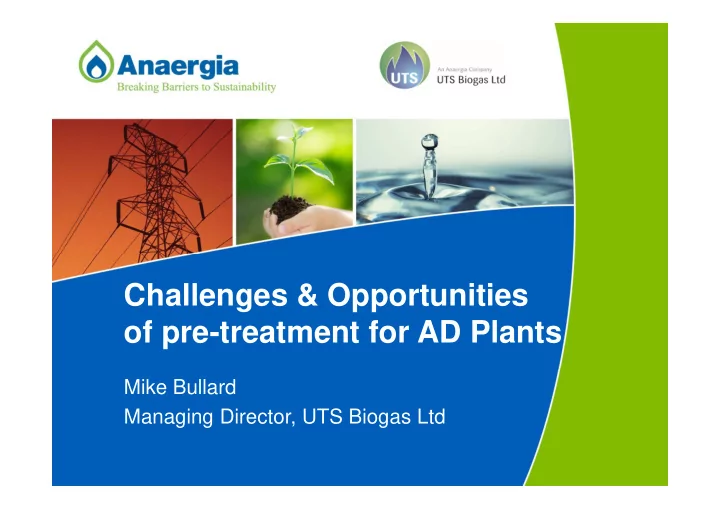

Challenges & Opportunities of pre-treatment for AD Plants Mike Bullard Managing Director, UTS Biogas Ltd
Contents • Introduction to UTS/Anaergia • “pre-treatment” agricultural systems In contrast to • “pre-treatment” SSO waste systems • Conclusions
Case-studies in the presentation Biogas plant May Biogas plant Dagenham, London Farm, Ely, Cambs Manure/grass Biogas plant, Yorkshire
About Anaergia/ UTS Biogas • Global technology leader in the recovery of value from organic waste streams Proven portfolio of proprietary technological solutions around • anaerobic digestion core • Flexible project delivery options, including process turnkey supply, DBOO (including financing) • Over 20 years of design and operating experience Core technologies used in over 1,600 digester plants with over 355MW • of capacity from biogas • UTS Biogas Ltd is the sole delivery agent for all Anaergia products in the UK and Ireland (UK based technical and project management) • In the UK: 9 plants operational, 4 larger facilities in-build. Turnkey design construct commission services; pre-treatment, biogas • production and utilisation; digestate management. CHP and BtG. EPC or technology supply. 4
Anaergia’s Technology Platform Built On In-house Manufacturing, R&D and Exclusive Partnerships Organics Pre-treatment Core Technology Post Treatment Organics Extrusion Solids Separation Residuals Drying DB Technologies Anaergia / UTS Therma-Flite (Exclusive Partner) Hydraulic Mixing Membranes Anaergia / UTS Fibracast (Subsidiary) Recyclable Recovery Service Box Gasification DB Technologies Anaergia / UTS KIV (Exclusive Partner) Materials Handling Biogas Upgrading Anaergia / UTS Greenlane (Partner) Anaerobic Digesters Anaergia / UTS
Pre-treatment; what’s the problem?
Key issues • Heterogeneity – good pre-treatment produces homogeneity in the feed material • Contamination – good pre-treatment removes contaminants effectively • Accessing the organics – good pre-treatment capture a high proportion of organics for AD • Recyclates recovery – good-pre-treatment enhances recyclate value • Keeping the organics clean – boosts gas yields • Achieving PAS110 – all of the above needed to achieve PAS110 and thus meet end of waste criteria
May Farm Digestate Storage Tank Secondary Fermenters Primary Fermenters CHP Area Pasteurisers & Separator
May Farm process flow Output-Fibre Incoming Separator Separated Solid Digestate Solid Feed Digestate Storage Tank Buffer Tank Weighbridg e Batch pasteurisatio n Conditioning Maceration Feed Primary Secondary hopper Fermenter Fermenter Conditioning CHP Desulphurisatio n Output Output Output Liquid Electricity Heat digestate
Grass/ manure Biogas plant
Grass/ manure Biogas plant Output-Fibre Incoming Incoming Separator Separated Solid Digestate Solid Liquid Digestate Storage Tank Receptio Weighbridge n tank Conditioning Feed Fermenter hopper Stone Trap CHP Desulphurisation Output Output Output Liquid Electricity Heat digestate
Static pre-treatment solution
Mobile pre-treatment solution
Dagenham Composting building
Output-Fibre Hall Incoming Separator Separated Solid Digestate Waste Digestate Storage Tank Buffer Tank Weighbridg e Batch pasteurisatio Reception building n Biowaste Maceration Preparation Primary Secondary Receptio equipment Fermenter Fermenter n tank CHP Desulphurisatio n Output Output Output Liquid Electricity Heat digestate
SSO treatment - Key process design parameters - Process design parameter Unit Value Solid concentration organic fraction % of wet 25 – 35 Volatile solids organic fraction % of dry 85 – 95 Solid concentration input digester % of wet 25 - 30 Solid concentration output digester % of wet 10 - 15 kg VS/(m 3 *d) Organic loading digester 6.5 – 8 Hydraulic retention time (HRT) digester Days 40-60 Specific biogas production Nm 3 /t VS 680 – 750 Nm 3 /t wet Specific biogas production 130 – 150 Contamination levels % (w/w) 3-25%
MSW / SSO treatment - Low contamination -
SSO upfront processing system: Hammer Mill Hammers disintegrate contaminants • (glass, plastic) • Organic fraction for AD is ‘contaminted‘ with glass, plastic • The more the SSO contamination level as more water is required to process the SSO • Challenged by contamination > 10% - Grit and plastic separation systems are required if highly contaminated SSO is treated • More process water = greater digester size = greater costs • Biobags are an issue • Not suitable for processing biowaste with high green waste content • Heavy parasitic power consumption • Reject stream needs to be pressed to reduce moisture content • Difficulty dealing with heterogenous wastes 19
Other SSO: alternative upfront processing systems 20
Impacts of poor pre-treatment • Poor removal of contraries leading to build up of silts, sediments, plastics floating layers. • Loss of digester capacity – silting and additional water addition • Potential toxicity • Failure to achieve PAS110 (plastics) • Extra costs of post-process digestate screening • Additional mixing causing higher electricity consumption • Greater organics carry-over in residual waste stream; loss of biogas yield and potential recycling target issues • Blockages • Additional pump wear and tear – increased opex • Heterogeneity – loss of gas yield
Conclusions • Hammer-mill and turbo-separator systems available in the market place: – Require significant amounts of process water and therefore have cost impacts on remainder of plant design – Do not cope with high levels of impurities – Do not recover high proportions of organics – Leave a dirty residual stream – Have high opex costs – Do not give a clean organics stream • The waste industry needs something better!
Thank you Mike Bullard Mike.bullard@uts-biogas.com 0044 1480 477608
Recommend
More recommend